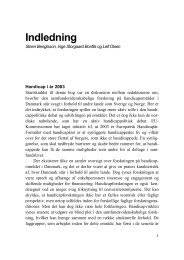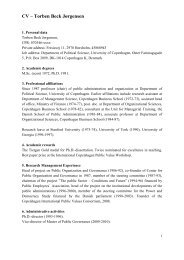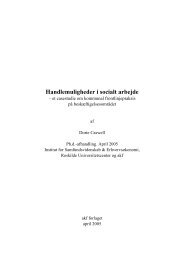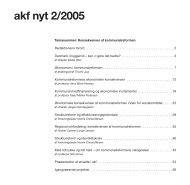Fremtidens ældre - Amternes og Kommunernes Forskningsinstitut
Fremtidens ældre - Amternes og Kommunernes Forskningsinstitut
Fremtidens ældre - Amternes og Kommunernes Forskningsinstitut
Create successful ePaper yourself
Turn your PDF publications into a flip-book with our unique Google optimized e-Paper software.
cy). But it is also important that more young people, immigrants and refugees<br />
are drawn into the workforce. Finally, it should be possible to change<br />
the pattern of retiring from the workforce, so that more elderly are encouraged<br />
to stay longer on the labour market – either full or part-time. There is<br />
something strange about how people in Denmark retire from one day to the<br />
next – they go from working 37 hours a week to not working at all. Many<br />
elderly would undoubtedly be happy to continue working longer, if their<br />
workloads could be reduced (and it was worth their while financially). And<br />
many elderly could be engaged in community work. Since the 70-year-olds<br />
are healthier and more agile than previously, some of them might perhaps<br />
find it worthwhile to help other elderly.<br />
The financial structure of the Danish welfare system should undoubtedly<br />
be reorganised. In view of the fact that there are many (and will be<br />
more) affluent pensioners, the l<strong>og</strong>ical approach would be to have them pay<br />
for some of the services that the state provides. Home care is a good example,<br />
but even visits to a GP could be covered by user charges. However,<br />
user charges alone cannot solve all the problems. Today, the majority of<br />
pensioners in Denmark would not be able to afford them, and even in 30<br />
years (when the Danish Confederation of Trade Unions’ pension scheme is<br />
fully developed) there will be a substantial minority who will not be able to<br />
afford user charges.<br />
Calculations show that increased employment rates (high pension<br />
ages) and user charges can at the most solve no more than a quarter of the<br />
financial problem. The remainder will have to be dealt with through fiscal<br />
policy. However, the problem is far from unsolvable. And the elderly may<br />
become important participants in confronting this challenge. But if we do<br />
not begin to face the challenge now, we could easily end up with a painful<br />
quick-fix solution.<br />
70
















